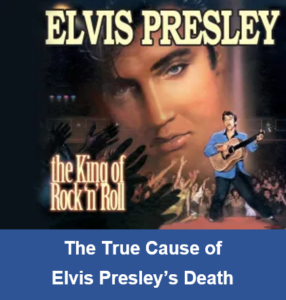 Elvis Presley suddenly dropped in the bathroom of his Graceland mansion on the afternoon of August 16, 1977. He was rushed to Baptist Memorial Hospital in Memphis, Tennessee, pronounced dead, then shipped to the morgue and autopsied the same afternoon. Three days later, the coroner issued Elvis’s death certificate stating the cause as “hypertensive cardiovascular disease with atherosclerotic heart disease” — heart attack for short.
Elvis Presley suddenly dropped in the bathroom of his Graceland mansion on the afternoon of August 16, 1977. He was rushed to Baptist Memorial Hospital in Memphis, Tennessee, pronounced dead, then shipped to the morgue and autopsied the same afternoon. Three days later, the coroner issued Elvis’s death certificate stating the cause as “hypertensive cardiovascular disease with atherosclerotic heart disease” — heart attack for short.
However, toxicology results soon identified ten pharmaceutical drugs in Elvis’s system with codeine being ten times the therapeutic level. This revelation started accusations of a cover-up and suggesting conspiracy theories of a sinister criminal act.
Pushing forty years after, modern medicine and forensics took a new look at the Presley case facts and determined something entirely different from a heart attack or a drug overdose really killed the King of Rock & Roll.
Hindsight being twenty-twenty, let’s first look at how death investigations should be conducted. Then we’ll explore the true cause of Elvis Presley’s death.
Coroners are the judge of death. It’s their responsibility to establish six main facts surrounding a death. (Coroners are not to assign blame.) In the Presley case, the facts determined at the time were:
Identity of Deceased — Elvis Aaron Presley.
Time of Death — Approximately 2:00 p.m. on Tuesday, August 16, 1977.
Place of Death — 3754 Elvis Presley Boulevard, Memphis, Tennessee.
Cause of Death — Heart attack.
Means of Death — Chronic heart disease.
Manner of Death — Natural
There’s a distinct difference between Cause of Death and Means of Death. Cause is the actual event. Means is the method in which death happened. Examples are cause being a ruptured aorta with means being a motor vehicle crash, or cause being massive cerebral interruption with means being gunshot wound to the head.
Once the first five facts are known, it’s the coroner’s duty to classify the Manner of Death. There are five universal death manner classifications:
- Natural
- Homicide
- Suicide
- Accidental
- Undetermined
Elvis Presley’s death was ruled a natural event, thought at the time as being an acute cardiac event resulting from existing cardiovascular disease. If the coroner determined Elvis died from a drug overdose, the ruling would have been accidental. No one ever claimed it was suicide or homicide.
One principle of death investigation is to look for antecedent evidence—pre-existing conditions which contributed to the death mechanism or was responsible for causing or continuing a chain of events that led to the death.
Another principle of death investigation is examining the triangle of Scene—Body—History. This compiles the totality of evidence.
Let’s look at the evidence in Elvis Presley’s death.
Scene
Elvis was found on his bathroom floor, face down in front of the toilet. It was apparent he’d instantly collapsed from a sitting position and there was no sign of a distress struggle or attempt to summon help. When the paramedics arrived, he was cold, blue, and had no vital signs. Rigor mortis had not set in, so he’d probably expired within the hour.
 He was transported by ambulance to Baptist Memorial Hospital where a vain attempt at resuscitation occurred because “he was Elvis”. He was declared dead at 3:16 p.m. and was shipped to the morgue where an autopsy was promptly performed.
He was transported by ambulance to Baptist Memorial Hospital where a vain attempt at resuscitation occurred because “he was Elvis”. He was declared dead at 3:16 p.m. and was shipped to the morgue where an autopsy was promptly performed.
There was no suggestion of suicide or foul play so there was no police investigation. The scene wasn’t photographed, nor preserved, and there was no accounting for what medications or other drugs might have been present at Graceland.
Body
Elvis was in terrible health. His weight was estimated at 350 pounds, and he was virtually non-functional at the end, being mostly bed-ridden and requiring permanent nursing care. He suffered from an enlarged heart which was twice the size of normal and showed advanced evidence of cardiovascular disease in his coronary vessels, aorta, and cerebral arteries—certainly more advanced than a normal 42-year-old would be.
 His lungs showed signs of emphysema, although he’d never smoked, and his bowel was found to be twice the length of normal with an impacted stool estimated to be four months old. Elvis also suffered from hypogammaglobulinemia which is an immune disorder, as well as showed evidence of an autoimmune inflammatory disorder.
His lungs showed signs of emphysema, although he’d never smoked, and his bowel was found to be twice the length of normal with an impacted stool estimated to be four months old. Elvis also suffered from hypogammaglobulinemia which is an immune disorder, as well as showed evidence of an autoimmune inflammatory disorder.
Toxicology tested positive for ten separate prescription medications but showed negative for illicit drugs and alcohol. The only alarming pharmaceutical indicator, on its own, was codeine at ten times the prescribed manner but not in lethal range.
History
Elvis was born on January 8, 1935, in Tupelo, Mississippi. He had a twin brother who died at birth. As a youth, Elvis was active and healthy which continued during his time in the army and all through his early performing stage when he was a bundle of energy. He began experimenting with amphetamines, probably to enhance his performances, but shied from alcohol as it gave him violent tendencies.
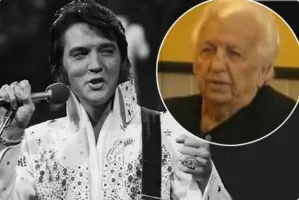 In 1967, Elvis came under the primary care of Dr. George Nichopoulos who was well-known to celebrities. Then, Elvis was 32 and weighed 163 pounds. His only known medical ailment was slightly high blood pressure, presumably due to his high-fat diet.
In 1967, Elvis came under the primary care of Dr. George Nichopoulos who was well-known to celebrities. Then, Elvis was 32 and weighed 163 pounds. His only known medical ailment was slightly high blood pressure, presumably due to his high-fat diet.
Also in 1967, Elvis’s health took a sudden turn with progressive chronic pain, insomnia, hypertension, lethargy, irrational behavior, and immense weight gain. Over his remaining years, Elvis was seen by many different doctors and was hospitalized a number of times, all the while resorting to self-medication with a wide assortment of drugs from dozens of sources.
Doctor Nick, as Nichopoulos was called, stayed as Elvis’s personal physician till the end. He was present at the death scene, as well as during the autopsy. Doctor Nick concurred with the coroner’s conclusion that the cause of death was a natural cardiac event resulting from an arrhythmia, or sudden interruption of heartbeat, and agreed that Elvis’s death was not due to a drug overdose.
When the toxicology report was released, it came with a qualifier:
“Diazepam, methaqualone, phenobarbital, ethchlorvynol, and ethinamate are below or within their respective ranges. Codeine was present at a level approximately 10 times those concentrations found therapeutically. In view of the polypharmacy aspects, this case must be looked at in terms of the cumulative pharmacological effect of the drugs identified by the report.”
Because the tox report appeared to contradict the autopsy report’s stated cardiac cause of death, a prominent toxicologist was asked to review the findings. His opinion was:
“Coupled with this toxicological data are the pathological findings and the reported history that the deceased had been mobile and functional within 8 hours prior to death. Together, all this information points to a conclusion that, whatever tolerance the deceased may have acquired to the many drugs found in his system, the strong probability is that these drugs were the major contribution to his demise.”
The Tennessee Board of Health then began an investigation into Elvis’s death which resulted in proceedings against Doctor Nick.
 Evidence showed that during the seven and a half months preceding Elvis’s death—from January 1, 1977, to August 16, 1977—Doctor Nick wrote prescriptions for Elvis for at least 8,805 pills, tablets, vials, and injectables. Going back to January 1975, the count was 19,012.
Evidence showed that during the seven and a half months preceding Elvis’s death—from January 1, 1977, to August 16, 1977—Doctor Nick wrote prescriptions for Elvis for at least 8,805 pills, tablets, vials, and injectables. Going back to January 1975, the count was 19,012.
These numbers might defy belief, but they came from an experienced team of investigators who visited 153 pharmacies and spent 1,090 hours going through 6,570,175 prescriptions and then, with the aid of two secretaries, spent another 1,120 hours organizing the evidence.
The drugs included uppers, downers, and powerful painkillers such as Dilaudid, Quaalude, Percodan, Demerol, and Cocaine Hydrochloride in quantities more appropriate for those terminally ill with cancer.
Doctor Nick admitted to this. His defense was because Elvis was so wired on pain killers, he prescribed these medications to keep Elvis away from dangerous street drugs, thereby controlling Elvis’s addiction—addiction being a disease.
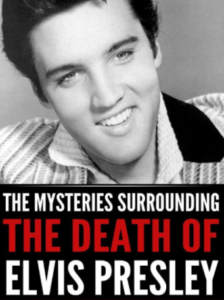 One of the defense witnesses was Dr. Forest Torrent, a prominent California physician and a pioneer in the use of opiates in pain treatment who explained how the effects this level of codeine would have contributed to Elvis’s death.
One of the defense witnesses was Dr. Forest Torrent, a prominent California physician and a pioneer in the use of opiates in pain treatment who explained how the effects this level of codeine would have contributed to Elvis’s death.
Central to misconduct allegations was the issue of high codeine levels in Elvis at the time of death—codeine being the prime toxicological suspect as the pharmaceutical contributor. It was established that Elvis obtained codeine pills from a dentist the day before his death and Doctor Nick had no knowledge of it.
The jury bought it and Doctor Nick was absolved of negligence in directly causing Elvis Presley’s fatal event.
Continuing Investigation
Dr. Torrent was convinced there were other contributing factors leading to Elvis’s death. In preparation for Doctor Nick’s trial, Dr. Torrent had access to all of Elvis Presley’s medical records, including the autopsy and toxicology reports. Incidentally, these two reports are the property of the Presley estate and are sealed from public view until 2027, fifty years after Elvis’s death.
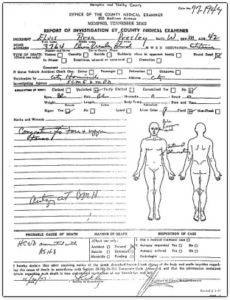 Dr. Torrent was intrigued by the sudden change in Elvis starting in 1967. He discovered that while in Los Angeles filming the movie Clambake, Elvis tripped over an electrical cord, fell, and cracked his head on the edge of a porcelain bathtub. Elvis was knocked unconscious and had to be hospitalized. Dr. Torrent found three other incidents where Elvis suffered head blows and he suspected Elvis suffered from what’s now known as Traumatic Brain Injury—TBI—and that’s what caused progressive ailments which led to his death.
Dr. Torrent was intrigued by the sudden change in Elvis starting in 1967. He discovered that while in Los Angeles filming the movie Clambake, Elvis tripped over an electrical cord, fell, and cracked his head on the edge of a porcelain bathtub. Elvis was knocked unconscious and had to be hospitalized. Dr. Torrent found three other incidents where Elvis suffered head blows and he suspected Elvis suffered from what’s now known as Traumatic Brain Injury—TBI—and that’s what caused progressive ailments which led to his death.
Dr. Torrent released a paper titled Elvis Presley: Head Trauma, Autoimmunity, Pain, and Early Death. It’s a fascinating read—recently published in Practical Pain Management.
Dr. Torrent builds a theory that Elvis’s bathtub head injury was so severe that it caused brain tissue to be jarred loose and leak into his general blood circulation. This is now known to be a leading cause of autoimmune disorder which causes a breakdown of other organs. But this was unknown in 1967, and Elvis went untreated. Side effects are chronic pain, irrational behavior, and severe bodily changes such as obesity and enlarged organs like hearts and bowels.
Today, TBI is a recognized health issue in professional contact sports.
With a change in mental state and suffering chronic pain, Elvis Presley entered a ten-year spiral towards death. He became hopelessly addicted to pain killers, practiced a terribly unhealthy diet and lethargic lifestyle, and resorted to the typical addict’s habit of sneaking a fix wherever he could. This led to early coronary vascular disease and, combined with his escalating weight and pill consumption, Elvis was a heart attack ready to burst.
Recall that I used the term antecedent, like all coroners do when assessing a cause of death. Given Dr. Torrent’s observations—and all the facts compiled from forty years—if I were the coroner completing Elvis Presley’s death certificate today, I’d write it like this:
Identity of Deceased — Elvis Aaron Presley.
Time of Death — Approximately 2:00 p.m. on Tuesday, August 16th, 1977.
Place of Death — 3754 Elvis Presley Boulevard, Memphis, Tennessee.
Cause of Death — Cardiac arrhythmia, antecedent to hypertensive cardiovascular disease with atherosclerotic heart disease, antecedent to polypharmacy, antecedent to autoimmune inflammatory disorder, antecedent to traumatic brain injury.
Means of Death — Complications from Cumulative Head Trauma.
Therefore, I’d have to classify the manner or classification of Elvis’s death as an Accident.
There’s no one to blame—certainly not Elvis. He was a severely injured and sick man. There’s no specific negligence on anyone’s part and, definitely, no cover-up or conspiracy in a criminal act.
If Dr. Forrest Torrent is right, which I believe he is, there simply wasn’t a proper understanding back then in determining the true cause of Elvis Presley’s death.

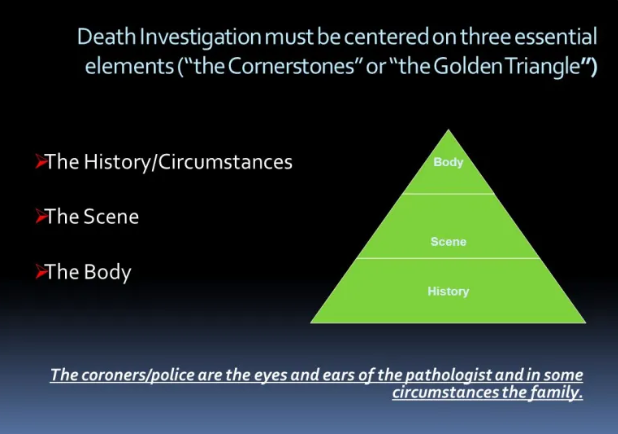
I always thought Colonel Parker, his manager, deserved a lot of the blame. IMO, he pushed Elvis to perform, even when he knew it was certainly not in Elvis’s best interest. If he had pushed Elvis into rehab, Elvis might still be with us. However,Parker thought more about profits than About Elvis. Keep Elvis fat and contented, wrks every time.
Great point about Colonel Parker’s influence. I know little about their relationship, or other’s relationships with Elvis, but I sense few stood in his health corner. His “friends” were fame and financial friends.
Elvis is dead? Not in Memphis. We see him all over the place.
I heard he works at the 7-11 at 4514 Millbranch Rd in Memphis.
Yes, face sheet! (I’m familiar with the one for JFK).
Thanks for the explanation.
It will be interesting to see what else that report reveals.
I saw him in a Las Vegas casino sitting at a table years ago (I think there was an Elvis convention lol).
Some of my cousins visited Graceland. Also, a past workmate visited Graceland who said there was a guy who hung around the private family quarters, and that people could get a glimpse of him. He wore sunglasses and looked a bit like an older Elvis. Apparently, it was a cousin of Elvis.
(I once saw a tabloid newspaper with a pic of an Elvis look-a-like seen through a side door at Graceland. Maybe that same cousin lol?)
I did some work on Ancestry.com and found that my grandson was related to Elvis’s mother. But that is not the point of this email. Both were Native American.
A professional genealogist studied his family for years. She found that few of his mother’s family members lived past the age of 43. They also all looked like Elvis: in a lot of pain, weird fat distribution on the body, and bowel problems. I don’t remember the name of the disease, but many of the family members on Mom’s side seemed to have suffered from it. It could not be diagnosed that long ago, but the genealogist kept at it and found out what it was based on the symptoms and the strange body fat distribution.
Have you heard of that?
Diane
Thanks for sharing this, Diane. I haven’t heard of this, and I have to say I know nothing about Elvis’s genealogy. I’m not even sure where I got started looking into Elvis’s death circumstances.
Garry, as always, your skillful detective work and conclusions are detailed, logical, and well thought out.
Fascinating info about the ancillary effects of TBIs, like auto-immune disorders and weight gain. How tragic they went undiagnosed.
Makes one wonder throughout history how many people who underwent radical personality changes and exhibited bizarre, inexplicable behavior might have suffered from TBIs. Were they accused of being witches or possessed by demons?
Thanks for unraveling the Elvis mystery. Great post, Garry!
Thank you so much for your compliments and continual support, Debbie. I truly appreciate it! Have you ever heard about Phineas Gage – the railroader who had a steel bar driven through his head from a dynamite accident? He lived, but the damage to his brain tuned him from Jekyll to Hyde. Here’s a link to a Smithsonian article on the case: https://www.smithsonianmag.com/history/phineas-gage-neurosciences-most-famous-patient-11390067/
I remember when he passed. My older sister was a fan. My father was a police officer. A part-time musician and lover of food and alcohol. A lot of discussions occurred in our home pertaining to his weight gain, never mind his untimely death and toxicology report.
It is good to see a ‘recalibration’ of the facts with a clearer understanding of cause and effect. Thank you, Gary.
You’re most welcome, Evelyn. I hope in some small way this serves to support Elvis’s memory and expose what really happened to him. Speaking of memories, I distinctly remember where I was when I heard of his passing. I was twenty and working for the railroad in northwestern Ontario. I’d just returned to the truck after fixing something on the track, turned on the radio and heard talk of the Presley funeral. At first, I thought it was Vernon Presley they were discussing and then, with a shock, I realized it was The King himself. Far, far too young and what a loss to the world of music.
I was a teenage student working for my dad in the summer (he co-owned a construction business).
It was a shock.
I think what you found adds context because he seemed athletic in his younger days. He played racquet ball at his mansion too. But the weight gain didn’t quite add up (no pun intended). Obviously, that would affect his health and well-being. I thought hus obesity plus his reliance on prescription drugs took its toll.
Good stuff, Garry. Very enlightening.
Thanks, Gary!
Thank you for this extra information. Long live the King. Gone way to young.
You mentioned that the autopsy report was sealed for 50 years. Where was that autopsy diagram from?
Much welcome, Gerry. The diagram is called a face sheet, and I downloaded while rummaging through Dr. Torrent’s material. The report itself is sealed which is the detailed account of the anatomical findings and is not publicly available – at least not that I could find.